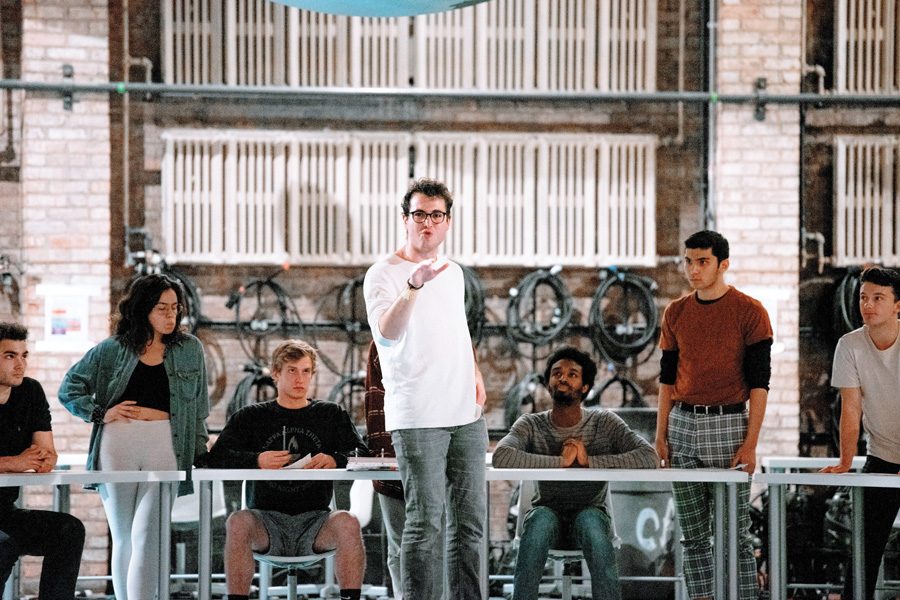Northwestern theater aims for growth in inclusivity of organizations, productions
Daily file photo by Evan Robinson-Johnson
Cast members rehearse Waa-Mu’s 88th show “For The Record.” The musical theater organization is working to make room for different voices and experiences in this year’s show.
October 2, 2019
As a new season of shows begins, members of the Northwestern Student Theatre Coalition are affirming their commitments to make their organizations and productions more inclusive of marginalized students.
Communication senior and co-chair of The Waa-Mu Show Emma Griffone said she’s proud that the musical theater organization has transformed into a more welcoming space for people of color since her first year at Northwestern University.
Last year, Griffone served as Waa-Mu’s first co-director of accessibility, inclusion and diversity. She said Waa-Mu is also working to make room for different voices and experiences in this year’s show.
“Since my freshman year, (there’s been) conversation of how theater can be more inclusive and reflective of various groups that are not just white, cis-identifying people,” Griffone said. “That’s not just reflected in race, but in terms of gender identity, sexuality and socioeconomic status. It’s really heartening to see it’s become a big part of the mission statement of a lot of theater boards.”
According to the group’s co-marketing and publicity director Yama Pouye, Spectrum Theatre Company aims to create a space where minorities can voice their experience. The Communication sophomore added that the socio-political theater group’s Fall shows aim to highlight voices outside the dominant narrative.
This year, Spectrum will present “Never Not Once,” a play focused on a mother retroactively exploring her journey with sexual assault. Pouye said the production includes marginalized characters who aren’t tokenized.
“A lot of times when there’s theatre that talks about underrepresented people, it’s very tokenized,” Pouye said. “It’s hard to see a play where there’s, say, someone who’s black on stage and it isn’t about them being black on stage.”
Marginalized people remain a minority among theater majors, Pouye said. She’s currently casting a staged reading that needs three Latinx actors, but she’s struggling to find people who aren’t already busy with other shows.
Still, Communication sophomore Simran Deokule, business manager for Lipstick Theatre, said she thinks Northwestern’s theater community is committed to making progress in terms of inclusivity.
Last year, Lipstick released a statement apologizing for “a distinct lack of representation and diversity” in the feminist theater board’s “Burlesque” show. According to Deokule, the board will offer a series of empowerment workshops open to everyone in the fall.
“The whole effort is to make sure that ‘Burlesque’ is a safe space for everyone who wants to perform,” Deokule said. “(Lipstick wants to) rectify any mistakes that we may have made in the past and be super conscious about all our actions.”
The Dolphin Show also sparked controversy about inclusion after tense discussions about race in the show’s selection process last year.
Communication sophomore and WAVE Productions community outreach coordinator Mariana Leone said that while the Dolphin situation didn’t affect WAVE specifically, she thought it was a good reminder for everyone in the StuCo community to listen to each other.
This year, WAVE’s productions will feature nonbinary and transgender voices and shine a spotlight on Zelda Fitzgerald, the 1920s writer known for her marriage to F. Scott Fitzgerald. Leone said the company has made a concerted effort to prioritize diversity and inclusivity in its process of selecting stories and collaborators.
“We see this happening in this small, sort of microscopic world of Northwestern theater, but this is happening out in professional theatre everywhere,” Leone said. “This is a conversation that the StuCo community’s going to continue to have for many years to come.”
Email: [email protected]
Twitter: @jenniferzhann


